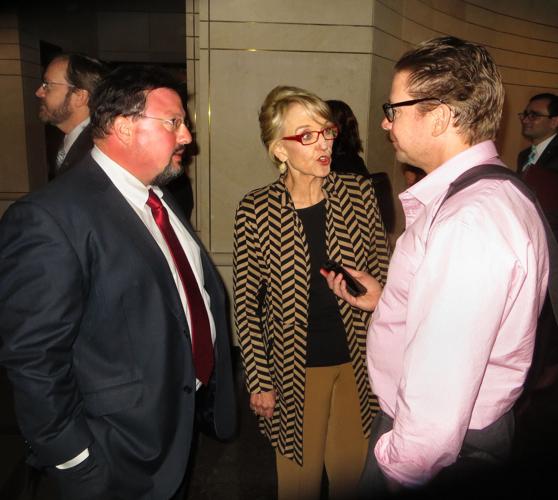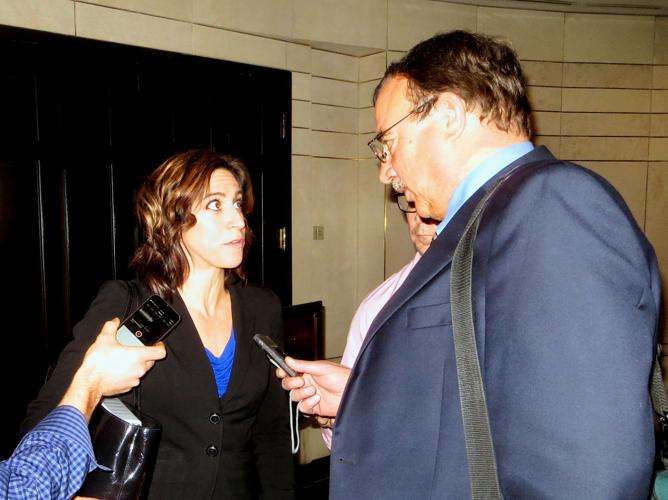PHOENIX — Current and former legislators asked the state Court of Appeals on Tuesday to void the financing mechanism that enables more than 400,000 Arizonans to get free or low-cost health care.
Goldwater Institute attorney Christina Sandefur, representing foes of the levy, reminded the judges that voters in 1992 adopted Proposition 108. It adds a provision to the Arizona Constitution requiring a two-thirds vote of both the House and Senate for any new tax or increase in state revenues.
Legislation adopted by lawmakers in 2013 and signed by then-Gov. Jan Brewer to finance the state’s share of the Medicaid expansion program with a fee on hospitals was approved by only a simple majority. Sandefur told the appellate judges that makes the levy unconstitutional.
But appellate Judge Kenton Jones said the claim of illegality is based on the assumption that the levy is, in fact, a tax. And Jones said it’s just as plausible that the $265 million a year being raised from hospitals is an administratively set assessment, specifically exempt from Proposition 108.
Hanging in the balance is the expansion of the Medicaid program engineered by Brewer.
“It was really, actually, the only solution for the people of Arizona facing the crisis that we were facing,” the former governor said Tuesday, as she showed up in court to personally watch the arguments. “I think it was the right thing to do,” Brewer continued. “It saved lives. It insured more people. It brought money into the state. It kept rural hospitals from being closed down.”
But the fate of the program rests not on what good it may be doing, but whether it is constitutional.
Before 2013, the Arizona Health Care Cost Containment System, the state’s Medicaid program, provided free care for most people whose earnings fall below the federal poverty level.
Brewer found a provision in the federal Affordable Care Act that pays virtually the entire cost for states to expand eligibility to include people making up to 138 percent of the poverty level, currently $35,218 for a family of three.
To get the federal dollars, however, Arizona had to reverse a law passed early in the recession that stopped enrolling single adults below the poverty level.
Brewer came up with a plan to have the state’s share of that paid through an assessment on hospitals, with the amount set by AHCCCS Director Tom Betlach. The hospitals went along because the levy would be less than the Medicaid dollars they would collect for caring for patients who otherwise would show up in the emergency room with no ability to pay.
When the plan passed by a simple majority, the lawmakers who voted against it sued.
If the courts determine the levy is a tax that needed a two-thirds vote, then the state revenues — and the matching federal dollars — go away.
Sandefur acknowledged the Legislature did not set the amount of the levy and that the 2013 law specifically authorized the AHCCCS director to raise money.
But she told the appellate judges that voters adopted the requirement for a two-thirds vote specifically “to put limits on the ability of government to raise revenue.”
“This is very, very broad proposition that the voters passed here,” Sandefur argued. “To just say that the Legislature can hand over that kind of power by a bare majority would completely undermine the purpose of Prop. 108 itself.”
She also acknowledged the constitutional exception from the supermajority margin for assessments imposed by agency directors. But Sandefur told the judges that even if the levy is an assessment — and even if Betlach gets to decide the amount — it took an act of the Legislature to authorize him to levy it.
“That is the most circular argument I think I’ve ever heard,” responded Judge Paul McMurdie.
And Judge Patricia Norris said if the court buys the Goldwater Institute argument, it makes the exception in Prop. 108 for assessments meaningless.
Norris said there’s another flaw in Sandefur’s argument.
She said taxes are generally defined as being for a general public benefit, and that the plan to get more people covered by Medicaid “has some general public purpose.”
But Norris said this levy is different.
“It’s designed to specifically deal with a problem that the hospitals are facing,” the judge said.
“This is designed to defray the cost of doing business with an indigent population.”
Sandefur did not see it that way.
“The purpose is to take care of Arizona’s poor by providing them with health care,” she told the court. “The ultimate purpose of this is a public purpose.”
That logic did not sway Jones.
“Doesn’t your analysis leave us where everything is a tax?” he asked.
Tuesday’s hearing followed a 2015 ruling by Maricopa County Superior Court Judge Douglas Gerlach that the levy is an assessment not subject to the supermajority requirement. Whichever side loses here is expected to seek review by the Arizona Supreme Court.
The appellate court did not indicate when it will rule.





